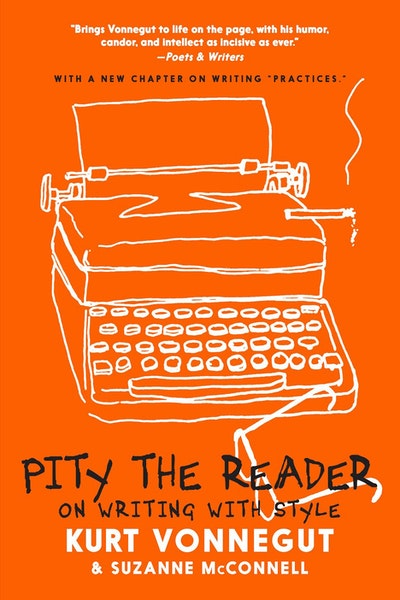- Published: 5 January 2021
- ISBN: 9781644210215
- Imprint: Seven Stories Press
- Format: Paperback
- Pages: 448
- RRP: $45.00
Pity the Reader
On Writing with Style
- Published: 5 January 2021
- ISBN: 9781644210215
- Imprint: Seven Stories Press
- Format: Paperback
- Pages: 448
- RRP: $45.00
"This book is a wonderful way of eavesdropping into the mind of one of the greatest writers in American history..." --James McBride, author of the National Book Award-winning novel, The Good Lord Bird
"Irresistible, big-hearted and helpful to writers at whatever stage of their craft or their life. ... a true help, for all of us at any age, who yearn to write with style." --Gail Godwin, bestselling author of A Southern Family and Old Lovegood Girls
guide to making art with words, Pity the Reader: Writing With Style is a simply mesmerizing book, and I cannot recommend it highly enough!” —Andre Dubus III The blend of memory, fact, keen observation, spellbinding descriptiveness and zany characters that populated Vonnegut’s work is on full display here, in a kind of workshop forum, with explanations by the writer himself, as recorded by a fellow writer, McConnell, who knew Vonnegut for decades. The result is Vonnegut as we’ve never seen him before, a man of kindness and generosity, humility and extraordinary introspection, whose humor and creativity served as a kind of protectorate, a shield, and most importantly a fountain of creativity to quench his life-long thirst for a better, kinder planet. It’s a must read for any young writer." —James McBride, author of the National Book Award-winning novel, The Good Lord Bird “Pity us not at all! What could be more welcome than Kurt Vonnegut’s acerbic writing advice expertly illuminated by veteran teacher/writer/editor Suzanne McConnell. A timely book for writers, readers, teachers and book-lovers alike. It’s unsentimental, unvarnished, and 100 percent treacle-free. If you’ve longed to be under Vonnegut’s spell once again, this is the book for you.” —Danielle Ofri, MD, author of What Patients Say, What Doctors Hear "I hate getting advice, personally. This is not that kind of book—it complains grumpily about the discomfort required to write truthfully and it celebrates the long history of art as 'a very human way of making life more bearable.' In short, it reminds us of the important things. Suzanne McConnell takes us eloquently into the joys of rediscovering Vonnegut, in a guide that will be profoundly useful to writers thinking about fiction’s purposes as well as its methods." —Joan Silber, author of Improvement, winner of the National Book Critics Circle Award "This is such a rich, generous book about writing and reading and Kurt Vonnegut as writer, teacher, and friend, that I find myself at a loss for the right good words. It’s a breeze to read. Every page brings pleasure and insight. It captures the spirit of the man some of us were lucky enough to know and gives future generations a sense of him as a teacher and writer. It traces how Vonnegut grew as a writer and how his writing took shape. I have read it three times now and find it not only a meticulous homage and worthy memorial to a great human being and a lasting writer, but a true help, for all of us at any age, who yearn to write with style.” —Gail Godwin, bestselling author of A Southern Family among many others novels, and the forthcoming Old Lovegood Girls


